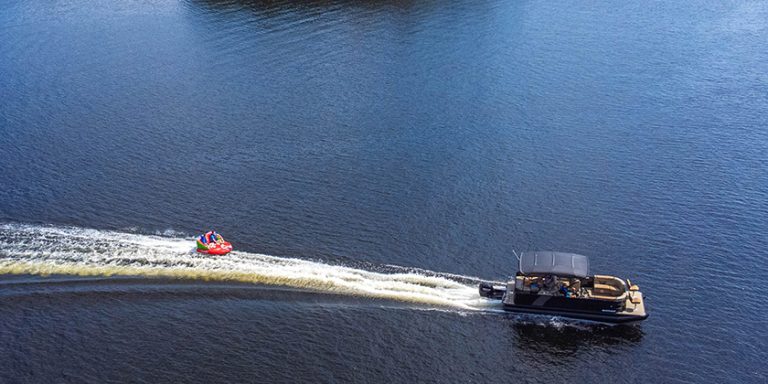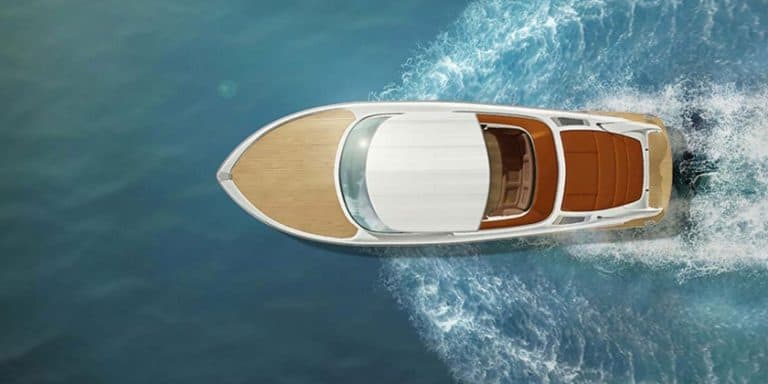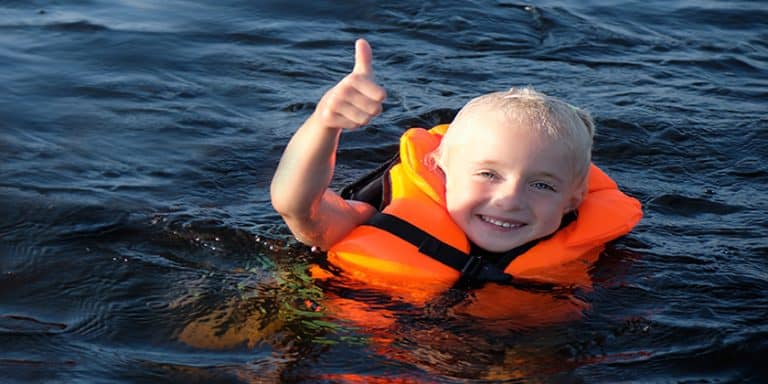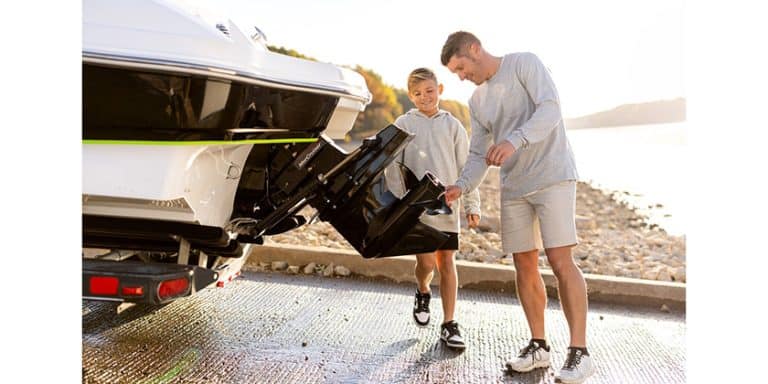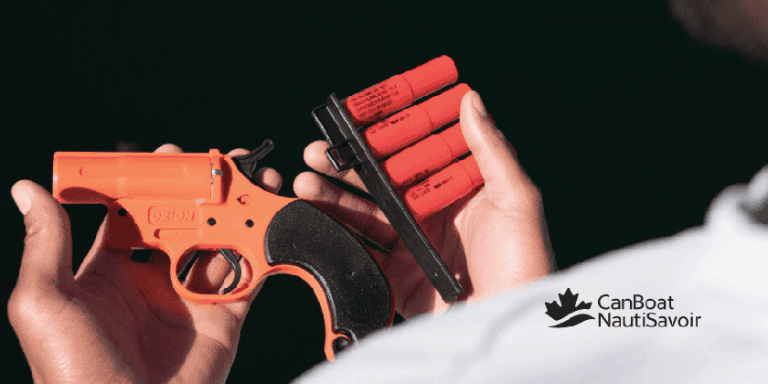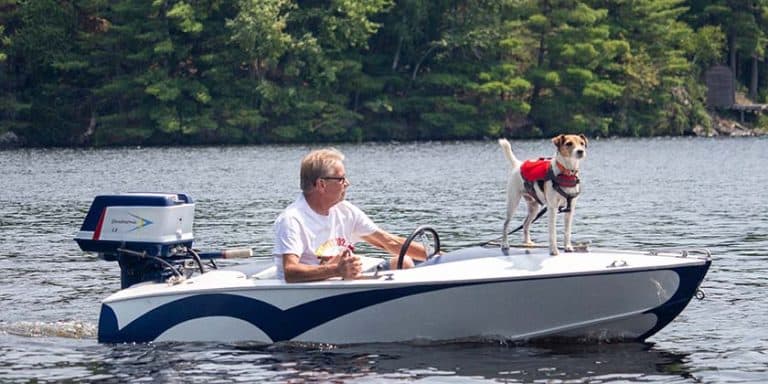Don’t Panic!
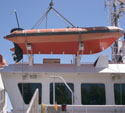
 Two simple words really. We’ve all heard ’em. Sound pretty d’urn simple – at least in practice. Of course, when things go south keeping a level head or a steady hand are easier said than done. And if worse comes to worst, panicking makes it even…worse, if that’s possible.
Two simple words really. We’ve all heard ’em. Sound pretty d’urn simple – at least in practice. Of course, when things go south keeping a level head or a steady hand are easier said than done. And if worse comes to worst, panicking makes it even…worse, if that’s possible.
Panicking is (usually) not a voluntary action. It is a result, at least in my experience, of the brain receiving too much input of such a diverse, abnormal and overwhelming nature that logical and practical and even well-rehearsed actions and decisions are impossible to carry out.
Dealing with an intense situation is never fun but it is probably easier when on dry land than bobbing around in a boat. On dry land you can step away from the action; on a boat you can run several feet or meters away but ultimately to stay away from it you are going to be running around in circles or perhaps right over the side which is going to lead to a whole other set of issues.
So, panicking when on a boat is something that you should not have happen. But boating can throw a lot of surprises at you – water pouring into the bilge; a squall out of bright sunny day; that other boater coming at you seemingly out of control; a power system SNAFU; losing your bearings and realizing you are lost; man overboard!
These situations might be handled by the adept boater – the adept boater who is able to stop the cascading events that would take them down the path to crisis because they have experience under their belt; have taken training courses; have prepared emergency plans for shipboard situations; mentally visualized themselves and their crews handling those surprises; actually rehearsed with their crews how to deal with various incidents; and they are able to recognize and interpret the first signals of things going awry, calmly take actions to deal with them and know that if they or someone else on the crew panics, it’s a quick course to disaster.
Have you ever been there? On the doorstep to disaster…to losing control…to yelling at your crew…to nailing the throttles…or throwing the helm over…or freezing right up as all hell breaks loose. It’s not a bad thing – if you have learned from it. That’s the benefit to having a panic attack. Once you know what it looks and feels like you realize you don’t ever want to be there again.
My episode of panic occurred several years ago. In fact it was in August 1983, in Nova Scotia while in my 4th year of teaching sailing. It was a beautiful summer day with temperatures in the high 20s and winds at 10 knots. There were probably 60 kids in a fleet of 420’s, Petrels and Albacores with three “crash boats” each with that club’s requisite instructor and lifeguard – except mine. I had a 10 ft. inflatable zodiac with a 15 hp all to myself that day.
Hot, humid summer days do breed small, nasty disturbances especially when ocean tides bring in cool water. They sneak up on you quick, kick you in the teeth and then run away just as briskly. Kind of like the school bully. No one saw this one coming and we should have but everything was fine – kids were having fun, tacking and gybing, rounding marks, beating upwind and only a few collisions. Then wham! From 10 knots to 25 knots in no time flat, dark skies, rain and chaos. It was over in a flash but probably 40% of the boats were knocked down – tipped or turtled.
As I scanned my group, I saw boats being bailed, boats over on their sides, kids in lifejackets bobbing around them and I saw gleaming upturned white hulls in the returning sunshine. Internally, I notched up a level of intensity. Counting boats and bobbing heads, I realized one turtled boat stood out since there were 2 heads where there should have been 3 and the skipper was looking a little concerned. One more notch up. As I motored over, I continued to scan the broader situation and saw my instructor counterparts dealing with their own catastrophes, realizing I was really on my own. Add another notch. Coming alongside, the skipper bobbing in the water turned to me and yelled, “I can’t find Ethel!” Whoosh, add 2 notches now. Ethel was nowhere in sight but she was wearing a life jacket so she couldn’t be too far…down. I was going to have to find her but I was alone in the boat – I needed help. If I went in the water, my boat would drift away and then I was not much of a rescuer. Bing, bing, bing – almost over the top. I looked out across the water and saw one instructor dealing with mayhem and another closer to my location but going like a bat out of hell away from me and towards the dock. Oh my god, I’ve lost a student, I have no one in the crash boat to help me, I am all by myself! Bang –I lost it! The threshold was crossed and my involuntary reaction had me yelling at the top of my lungs to my co-instructor who would surely hear me through a 1/2 mile of distance, his 90 hp engine topping 5,500 rpms and wind buffeting his ears. Could I have been more of an idiot? (I later learned he was rushing a young student ashore who took a boom to the head, went over the side and was dragged by the mainsheet wrapped around her neck – no vitals. She survived due to great work by him and other well trained folks).
It’s quite amazing how infectious panic is. My performance immediately went right to the skipper in the water, to her other crew beside her, others around us and probably to Ethel who was certainly in ear shot but nowhere to be seen but was the one person who was in need of comfort and well trained, professional, effective and calm response. Just brilliant.
But then it happened. It was done. I realized I was an absolute imbecile and embarrassed for it. I had years of training and loads of experience and everything became quiet, I focused on the actions that needed to be taken and my speaking was slow and clear. I brought the crash boat alongside the turtled 420, had the skipper take the painter of the lightweight inflatable while holding onto her boat, and I went into the water and under the 420 into the air pocket. Sure enough, there was a snot-nosed, wide-eyed Ethel very happy to see me. After a few calming words and an explanation of the next steps, I grasped the front of her lifejacket and we took a breath and went down under the gunwale and up to the other side, breaking the surface next to a relieved skipper, crew mate and a whole bunch of other sailing students whose attention had been riveted to the scene. And everyone lived happily ever after.
In fact I may have been the happiest. Since that day I have never “lost it”. I remember every part of that event like it was just the other day and it is something I do not want to repeat. In the myriad of scenarios I have experienced since then either on the water of land, when a nasty surprise presents itself, I am one of the people who stops, takes in information, recalls training and responses that have been rehearsed or visualized, then carries out a calm response. The response may in fact be calling for help but it’s not at the top of my lungs to someone who will never hear – it may be to another person who can dial 911, or it may be me calling Coast Guard Radio with a prepared list of information.
Training, visualization, experience, rehearsing. Know your boat; know your crew, make them part of the action; know where you are; know where you are going and most of all, put it all together and – don’t panic.

